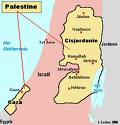Media Language that “Disappears the Palestinians”

The Guardian has about the best coverage to be found in the mainstream media of the Israel-Palestine conflict – which tells you quite how bad everyone else is.
Today the paper’s readers’ editor, Chris Elliott, ponders complaints about its coverage. Not surprisingly, many of them are from the Israeli embassy, which says it is concerned about the Guardian’s disproportionate interest in Israel-Palestine, implying that this is evidence of anti-semitism.
Actually it is quite the opposite. It is evidence of the Guardian’s historic and current support for the state of Israel, though not the occupation. Elliott alludes to this obliquely as he points out that the paper’s most famous editor, C P Scott, was instrumental in getting the British government to issue the Balfour Declaration. The Guardian’s pride in having helped to create a Jewish state is still palpable at the paper (as I know from my years there), especially among senior Jewish editors who influence much of the conflict’s coverage – yes, that is a reference to Jonathan Freedland, among others.
The Israeli embassy, of course, is trying to browbeat the Guardian to bring it into line with the dire coverage of the rest of the media.
The lesson the readers’ editor draws is:
When looking at these three complaints I think the important message is that if the Guardian is to continue its strong focus on Israel and Palestine, which it is entirely at liberty to do, we have to put a similar effort into the use and awareness of language that we use to discuss the issues on both sides.
And yet, as usual, the article only considers the problematic use of language regarding the Israeli side of the conflict. The reality is that the Guardian, like most western media, is really only interested in the Israel-Palestine conflict because of the Jews, not the Palestinians. There are many reasons for this:
- historic European guilt about the Holocaust;
- the central place of the Jews in Biblical stories most westerners were raised on in the still-Christian west;
- the sense that the Jews are more like us than the “Arabs” – that they are, as Theodor Herzl, the father of Zionism, put it, “a rampart of Europe against Asia, an outpost of civilization as opposed to barbarism”;
- the fact (mostly unmentionable) that Jews are strongly represented on the staff of western media often in senior positions, but rarely are there any Muslims or Arabs, and that many Jewish staff naturally identify with the plight of relatives in Israel;
- the continuing appointment to Jerusalem bureaux of partisan Jewish reporters who speak Hebrew but not Arabic; live in west Jerusalem, not East Jerusalem; whose younger children go to Jewish schools, not Arab schools; and whose older children serve in the army.
All of this is so normalised among the western media that the New York Times barely seems concerned that at least three of its senior writers on the conflict have had children serving in the Israeli army: Ethan Bronner, David Brooks and now, we discover, Isabel Kershner. We will know that we have an even-handed media only when we can conceive of a paper recruiting not only a Palestinian reporter (in itself almost impossible, it seems) but a Palestinian reporter with a child who openly supports Hamas (let’s not even try to imagine the possibility of their being allowed to have a child who fights in the resistance!).
As the Guardian’s Elliott inadvertently indicates, sensitivity about language is central to the concerns of papers like the Guardian when it comes to the Jewish side, but not so much when it comes to the Palestinians.
Today Moshe Machover, a London University philosophy professor, sent a letter to the readers’ editor that I reproduce below concerning a recent Guardian article. The Guardian’s report contains the usual insensitivities of language towards the Palestinians, so common-place that they are never noted or questioned. But this is about more than insensitivity. It is about the constant misuse of language in ways that work to Israel’s benefit by shaping how western publics understand the conflict. In fact, it is precisely such language that has enabled Israel to incrementally disappear the Palestinians.
Dear Readers’ Editor,
In yesterday’s Guardian there was a report by your Jerusalem correspondent Peter Beaumont about what is in fact Israel’s continued illegal colonization of east Jerusalem.
http://www.theguardian.com/world/2014/oct/27/israel-construct-settler-homes-east-jerusalem-netanyahu
It began:
“The Israeli government is to advance construction plans for 1,000 housing units to be built in parts of Jerusalem that Palestinians demand for their future state.”
The wording “the Palestinians demand” suggest that these parts of Jerusalem do not belong to the Palestinians but to someone else. This false impression is reinforced by what follows:
“The move, revealed by the prime minister, Binyamin Netanyahu, is the first in what is expected to be a series of announcements this week on new settlement construction work in East Jerusalem and on the occupied West Bank.”
Surely, “work in East Jerusalem and on the occupied West Bank” is wrong as it falsely suggests that East Jerusalem is not occupied but belongs to Israel; it should have been “work in occupied East Jerusalem and West Bank.” I am sure you will wish to correct this misleading wording in your next column.
Sincerely,
Moshé Machover

